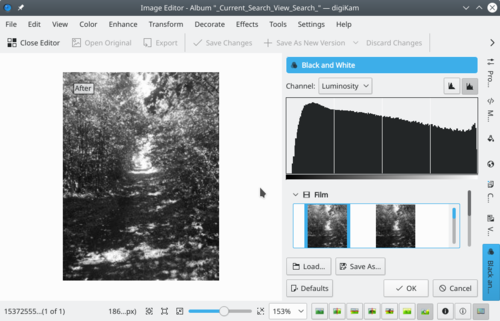Digikam/Blanc i negre
Convertir les fotos a blanc i negre amb digiKam
Transcrit des de l'article d'en Dmitri Popov, l'11 de febrer de 2011
Si us agrada la fotografia en blanc i negre, us encantarà saber que digiKam compta amb una eina força potent per convertir fotografies a blanc i negre. La conversió d'una fotografia que s'està editant a digiKam es fa en . Però en la majoria dels casos, serà necessari un ajust addicional, i l'aplicació ofereix unes enginyoses eines per fer-ho.

The section provides a handful of filters that emulate different film types like Agfa Pan, Kodak Tmax, Kodak TriX, and Ilford SPX. These filters offer a quick and easy way to tweak the black and white photo. Which film filter works best depends on the currently edited photo, so you might want to try several filters to achieve the best result. Select the filter you like, and you can immediately see the result in the preview pane.
As the name suggests, the section contains several color filters, including orange, green, yellow, and red. While you can experiment by applying different filters to the photo, the easiest way to find out which filter is best suited for the specific photo is to use the context help. Press Shift + F1 and click on any filter to get a brief description of it. Once you’ve applied the desired filter, you can specify its intensity by using the slider.
Besides the straight black and white conversion, digiKam lets you turn your photos into duotone images. And the section offers several tone filters such as sepia, platinum, and green.
Finally, the section lets you manually adjust the curve and the contrast. This feature can come in handy if you want to fix under- or overexposed areas and improve the overall contrast of the photo.
